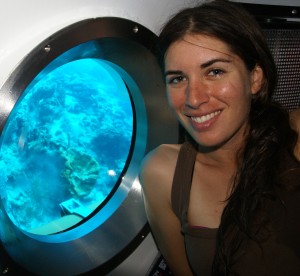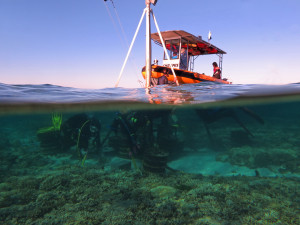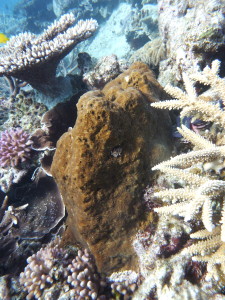 Coral reefs are the result of a constant battle between constructive and destructive forces. When it comes to biologically-driven destruction, erosion by excavating sponges is one of the most important yet understudied mechanisms. Global warming and acidification are predicted to enhance the impact of these sponges on reefs, tipping the balance to the disadvantage of corals and other calcifying organisms. Using Cliona orientalis as her model species, Michelle’s current work aims to decipher the metabolic dynamics of bioerosion and to evaluate the resilience of excavating sponges to future environmental conditions. Michelle joined the Coral Reef Ecosystems lab as a PhD student in 2014 after she finished her Master’s at the University of Amsterdam working on Caribbean reef sponges and majoring in science communication. She completed her first degree at the University of Crete in her homeland Greece.
Coral reefs are the result of a constant battle between constructive and destructive forces. When it comes to biologically-driven destruction, erosion by excavating sponges is one of the most important yet understudied mechanisms. Global warming and acidification are predicted to enhance the impact of these sponges on reefs, tipping the balance to the disadvantage of corals and other calcifying organisms. Using Cliona orientalis as her model species, Michelle’s current work aims to decipher the metabolic dynamics of bioerosion and to evaluate the resilience of excavating sponges to future environmental conditions. Michelle joined the Coral Reef Ecosystems lab as a PhD student in 2014 after she finished her Master’s at the University of Amsterdam working on Caribbean reef sponges and majoring in science communication. She completed her first degree at the University of Crete in her homeland Greece.

Installing equipment on the reef crest of Heron Island

The bioeroding sponge Cliona orientalis growing on Heron Island reef
Contact details
m.achlatis@uq.edu.au
Coral Reef Ecosystems Lab
School of Biological Sciences | University of Queensland
Level 7 Gehrmann Laboratories (60)
St. Lucia, QLD 4072 | Australia
Publications
Alexander B. E., Achlatis M., Osinga R., van der Geest H.G., Cleutjens J. P. M., Schutte B. , de Goeij J.M. (2015). Cell kinetics during regeneration in the sponge Halisarca caerulea: how local is the response to tissue damage? PeerJ 3:e820 https://dx.doi.org/10.7717/peerj.820
Achlatis M., van der Zande R.M., Schönberg C.H.L., Fang J.K.H., Hoegh-Guldberg O., Dove S. (2017). Sponge bioerosion on changing reefs: ocean warming poses physiological constraints to the success of a photosymbiotic excavating sponge. Sci Rep 7: 10705. doi:10.1038/s41598-017-10947-1
http://rdcu.be/vCOw
Ramsby, B. D., Hill, M. S., Thornhill, D. J., Steenhuizen, S. F., Achlatis, M., Lewis, A. M. and LaJeunesse, T. C. (2017). Sibling species of mutualistic Symbiodinium clade G from bioeroding sponges in the western Pacific and western Atlantic oceans. J. Phycol.. doi:10.1111/jpy.12576
http://onlinelibrary.wiley.com/doi/10.1111/jpy.12576/full
Achlatis M., Pernice M., Green K., Guagliardo P., Kilburn M.R., Hoegh-Guldberg O., Dove S. (2018). Single-cell measurement of ammonium and bicarbonate uptake within a photosymbiotic bioeroding sponge. ISME J DOI 10.1038/s41396-017-0044-2
Fang J.K.H., Schönberg C.H.L., Mello-Athayde M.A., Achlatis M., Hoegh-Guldberg O., Dove S. (2018). Bleaching and mortality of a photosymbiotic bioeroding sponge under future carbon dioxide emission scenarios. Oecologia 10.1007/s00442-018-4105-7
